Where did the planets get their names from?

The story of the names of the planets begins several thousand years ago, when the ancient Chaldean astronomers noticed that some stars, unlike others, move across the sky, which can be observed during several nights of observation.
Classical Greek and Latin sources frequently use the term Chaldeans for Mesopotamian astronomers.
Wandering stars
The ancient Greeks called those stars “planets” which in translation means “wandering stars”. If you know anything about astronomy, you must have read this countless times.
Now, in those old days five wandering stars were known, i.e. planets. The Greeks named them after their gods, but after the Greeks, the Romans came to the stage of history with a culture that dominated the ancient world for a whole millennium.
As it happens, advanced civilizations unsparingly take everything that is valuable to them from others, absorb and appropriate it, so the gods of ancient Greece became the gods of Rome, but with some corrections and with new names. And this is where the story about the names of the planets begins.
Hermes/Mercury
The planet closest to the Sun is also the fastest of all, and that is why the Greeks connected this to Hermes, a quick, cheerful young god, protector of thieves and messenger of the Olympian gods. The Romans gave it the name Mercury.
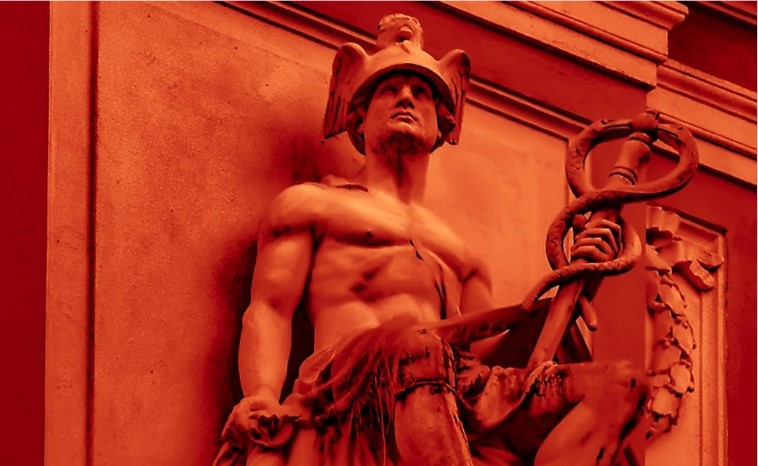
Aphrodite/Venus
The second planet is named after the most beautiful goddess, the goddess of love, Aphrodite. She was not very faithful to her husband, the blacksmith Hephaestus. In Rome, this goddess was named Venus.

Gaia/Terra
Next up is our beloved Earth, that is, Föld, Erde, Jord, etc., but traces of Greek and Roman influence can be seen in the expressions like geo and terra in all languages, or if not all, at least in European ones.

And Gaia was the Greek goddess of fertility. In Latin Earth is Terra.
Ares/Mars
Since ancient times, Mars has attracted attention with its reddish color, which for ancient peoples was mostly ominous and associated with wars, death and all such terrible things. The Babylonians called Mars Nergal after their god of death and plague.
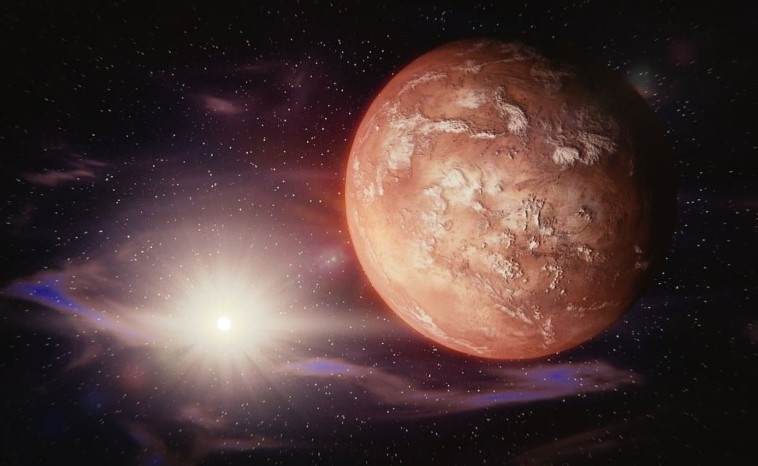
For Indians, Mars is the fire of heaven. The reddish glow of Helen was associated with blood spilled in war and they named this planet Ares after their god of war. The Romans called Ares Mars as he was their greatest and most revered god.
Zeus/Jupiter
After Mars, the largest planet of the solar system comes next. It was given the quite appropriate name Jupiter.
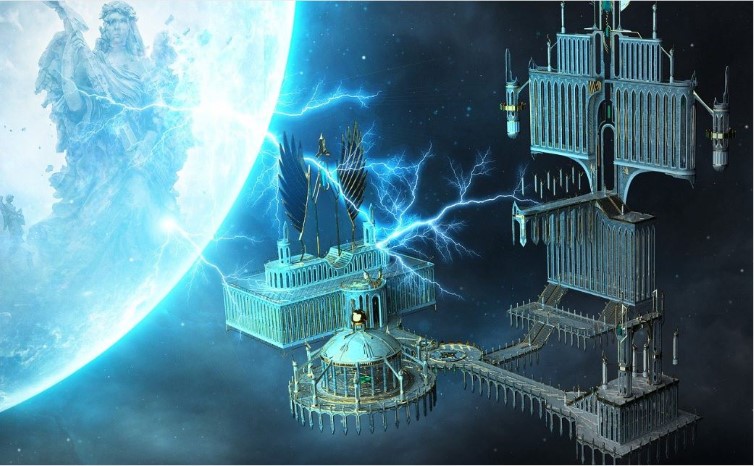
The Greeks called this planet after their god Zeus who, as you know, was the lord of all the other gods.
Cronus/Saturn
Saturn is the second giant planet, slightly smaller than Jupiter. The Greeks called him Cronus. Cronus was the father of Zeus.
Saturn, of course, is the Roman version of the Greek god Cronus. Saturn was once told by a prophecy that one of his children would dethrone him, and to prevent this, he devoured all his children – except for Zeus (who later actually dethroned him).
Spotting Uranus
So those were the planets that could be seen with the naked eye, since the telescope was only constructed at the very beginning of the 17th century.
But in the 18th century the number of known planets increased. This happened in 1781, when the British astronomer William Herschel realized that he was seeing a previously unknown planet in the eyepiece of his telescope.
It was actually a well-known object that Hipparchus recorded in his star atlas in 128 BC. Ancient astronomers could not observe its slow movement because it was very far away, so it was not known about its planetary nature.
Why? In astronomy there is a rule: what is slow is far away.
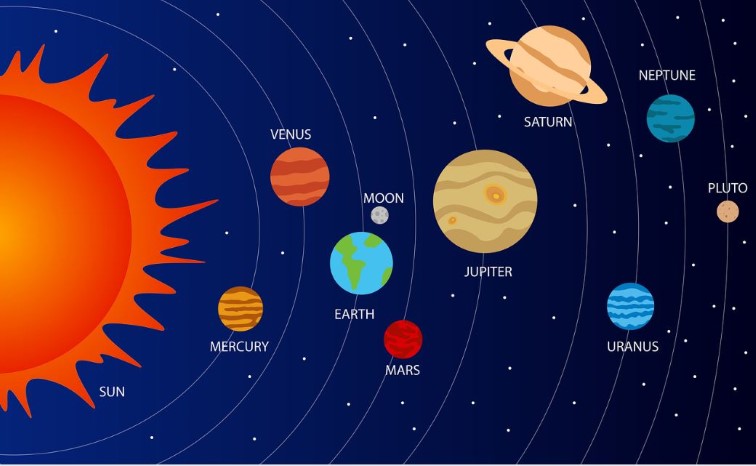
Even much later, in the era of telescopes, none of the astronomers paid enough attention to that point in the sky and it continued to pass by like an ordinary star.
But Herschel, who had an excellent telescope for that time, noticed its tiny disk (stars are point objects in the eyepiece), and its movement in relation to the surrounding stars.
It was a great discovery at the time and Herschel went down in history as one of the giants of astronomy. He suggested that the planet should be named after King George III, but after several decades of debate, the planet was still named Uranus after the ancient Greek god of the sky, the father of Cronus.
The proposal for this name was given by John Bode, a German astronomer who determined the orbit of this planet. Seen from today’s perspective, it was an excellent solution. It paved the way for the standardization of naming the planets for the future as well.
In the middle of the 19th century, astronomers noticed that there was a problem with the movement of Uranus because that planet deviated from the correct path calculated by astronomers.
Something was interfering with that movement, and that something could be the existence of another planet that was not in the catalog of objects in the solar system.
Poseidon/Neptune
After Uranus, Neptune was discovered.
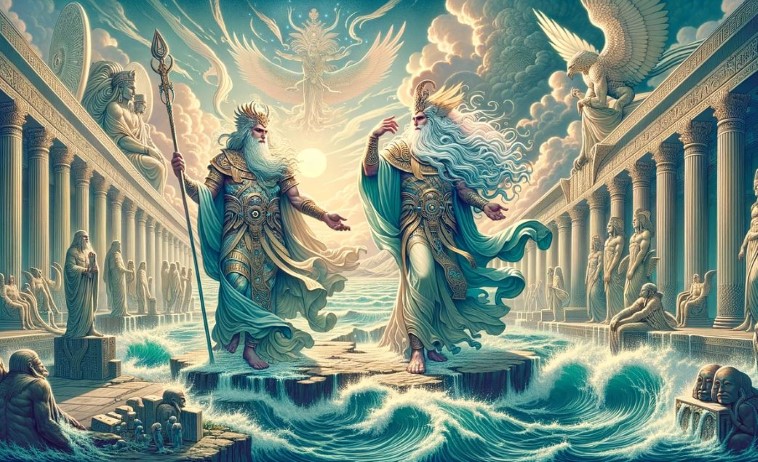
There were some doubts and disagreements about the naming of this planet, but in the end it was named after the Roman god of the sea, which was equivalent to the Greek Poseidon. Thus, the custom of naming planets after characters from Greek and Roman mythology has become established. By the way, Neptune is the god of the sea and the son of Saturn.
Also, did you know that here at OSR you can name stars?

